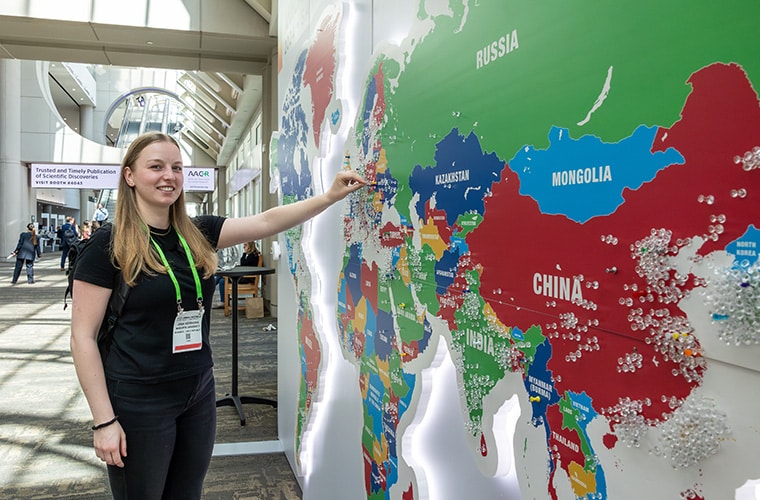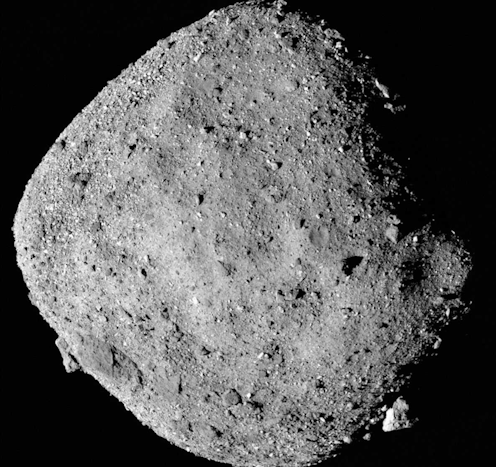With more than 23,200 registrants, the American Association for Cancer Research (AACR) Annual Meeting 2024 not only set a record number of registrants but witnessed the highest international participation to date.
As the world’s largest professional organization dedicated to advancing cancer research, the AACR has members in 141 countries and territories around the world and offers numerous opportunities to help investigators in the international community.
In fact, 62 out of 67 grants at the AACR are open globally including the AACR Scholar-in-Training Awards, the Global Scholar-in-Training Awards (GSITA), Women in Cancer Research (WICR) Scholar Awards, the Beginning Investigator Grant for Catalytic Research (BIG Cat), and Maximizing Opportunity for New Advancements in Research in Cancer (MONARCA). Additionally, education and training opportunities include AACR on Campus and several conferences around the world.
Even domestic conferences like the Annual Meeting provide international researchers with the opportunity to exchange knowledge and new ideas with other scientists dedicated to cancer research. This year’s meeting welcomed more than 8,000 international registrants—representing 36% of participants—from 78 countries and multiple territories.
Attendees were encouraged to place a pin on a map of the world to show where they came from. Photo by © AACR/Vera LaMarche 2024
“We are proud to highlight cutting-edge research from groups of scientists from around the world,” said Elizabeth M. Jaffee, MD, FAACR, chair of the AACR Global Affairs Committee. “Global collaboration enables strong scientific contributions to research, and we trust that the Annual Meeting provides a platform for researchers globally, to absorb and share new knowledge on emerging research, therapies, and treatment with colleagues and communities at home.”
The Annual Meeting also offers a platform to shine a light on cancer researchers and journalists through a number of awards with several international attendees among this year’s recipients. We asked a few of these award recipients about their experience attending the meeting and the importance of global collaboration in the conquest of cancer.
Exploring the International Perspective
Hellen Shikanda from Kenya became a journalist because she wanted to be a voice for the voiceless.
“Speaking to people who would not ordinarily get an opportunity to have their stories out there helps in empowering communities that they come from,” Shikanda said. “I have learnt that their stories, if told well, always have an impact on the policies that are enacted after those in leadership positions realize that there has been a gap that urgently needed to be filled.”
One of her stories was honored with the AACR June L. Biedler Award for Cancer Journalism, which was given to five journalists in four categories. Her article, “New Drug Promises Better Treatment for Cancer Patients,” relays a patient’s journey through five countries to get properly diagnosed with colon cancer and ultimately find hope for treatment in a clinical trial.
“I was happy to work on a story that explored clinical trials for a new drug that tackles a specific gene mutation—and the research was done in Africa for the first time,” she explained. “Global collaboration means that there will be funding opportunities for all researchers who can share insights on how they can help defeat cancer.”
Hellen Shikanda (far right) with the other 2024 AACR June L. Biedler Award for Cancer Journalism recipients. Photo by © AACR/Meg McLaughlin 2024
Anshika Chauhan, PhD, from India, is the recipient of one such funding opportunity as one of the many international winners of the AACR-WICR Scholar Awards. This award is given to members of WICR, a constituency group focused on women scientists within the AACR that celebrated its 25th anniversary at the meeting, who are scientists-in-training and presenters of meritorious scientific papers at AACR Annual Meetings. She presented her research on increased mitochondrial DNA copy number via EPOR signaling as a potential mechanism for metastatic dissemination in head and neck squamous cell carcinoma.
“The AACR gives women from different backgrounds, different geographical regions, and different phases of their career the platform to work together, learn from each other, and make a difference in fighting cancer,” Chauhan said. “So, it’s important to welcome women from all over the world into cancer research. By working together and sharing our ideas, we can make a big impact in the fight against this disease.”
Seifegebriel Feleke Teshome, from Ethiopia, was one of 15 early-career scientists from nine countries who were offered the chance to attend the meeting and present their work as a 2024 GSITA recipient. His poster focused on profiling the CpG methylation patterns of Epstein-Barr virus DNA in lymphoma patients from Ethiopia.
“During the meeting, numerous scientific researchers and young scientists from different parts of the world gathered to share their findings, achievements, and innovative approaches in cancer research,” he said. “This diverse community of attendees created a vibrant atmosphere conducive to engaging discussions and fruitful interactions.”
Many of these award recipients will share what they learned about the AACR’s global programs and initiatives with their colleagues back home as they work to overcome the worldwide challenge of cancer through scientific research.
The post AACR Annual Meeting 2024: A Global View on Cancer appeared first on American Association for Cancer Research (AACR).



